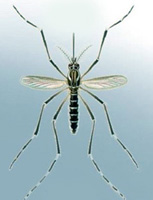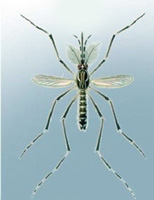MOSQUITO.......
Mosquitoes, the insects that are universally hated the world over. These pesky, disease-carrying pests make a living by sucking the blood out of just about anything that moves, including us. But take a moment to look at things from the mosquito's perspective. All mosquito need water to breed.
1. Mosquitoes are the deadlist animal on Earth.
More deaths are associated with mosquitoes than any other animal on the mosquitoes may carry any number of deadly diseases, including malaria, dengue fever, yellow fever, and encephalitis. Mosquitoes also carry heartworm, which can be lethal to your dog.
2. Only female mosquitoes bite humans and animals; males feed on flower nectar.
Mosquitoes mean nothing personal when they take your blood. Female mosquitoes need protein for their eggs, and must take a blood meal in order to reproduce. Since males don't bear the burden of producing young, they'll avoid you completely and head for the flowers instead. And when not trying to produce eggs, females are happy to stick to nectar, too.
Mosquitoes mean nothing personal when they take your blood. Female mosquitoes need protein for their eggs, and must take a blood meal in order to reproduce. Since males don't bear the burden of producing young, they'll avoid you completely and head for the flowers instead. And when not trying to produce eggs, females are happy to stick to nectar, too.
3. Some mosquitoes don't bite humans, preferring other hosts like amphibians or birds.
Not all mosquito species feed on people. Some mosquitoes specialize on other animals, and are no bother to us at all. Culiseta melanura, for example, bites birds almost exclusively, and rarely bites humans.
Not all mosquito species feed on people. Some mosquitoes specialize on other animals, and are no bother to us at all. Culiseta melanura, for example, bites birds almost exclusively, and rarely bites humans.
4. Mosquitoes fly at speeds between 1 and 1.5 miles per hour.
That might sound fast, but in the insect world, mosquitoes are actually rather slow.
That might sound fast, but in the insect world, mosquitoes are actually rather slow.
If a race were held between all the flying insects, nearly every other contestant would beat the pokey mosquito. Butterflies, locusts, and honey bees would all finish well ahead of the skeeter.
5. A mosquito's wings beat 300-600 timesper second.
This would explain that irritating buzzing sound you hear just before a mosquito lands on you and bites.
6. Mosquito mates synchronize their wing beats to perform a lover's duet.
Scientists once thought that only male mosquitoes could hear the wing beats of their potential mates, but recent research on Aedes aegypti mosquitoes proved females listen for lovers, too. When the male and female meet, their buzzing synchronizes to the same speed.
Scientists once thought that only male mosquitoes could hear the wing beats of their potential mates, but recent research on Aedes aegypti mosquitoes proved females listen for lovers, too. When the male and female meet, their buzzing synchronizes to the same speed.
7. Salt marsh mosquitoes may travel up to 100 miles from their larval breeding habitat.
Most mosquitoes emerge from their watery breeding ground and stay pretty close to home. But some, like the salt marsh mosquitoes, will fly lengthy distances to find a suitable place to live, with all the nectar and blood they could want to drink.
Most mosquitoes emerge from their watery breeding ground and stay pretty close to home. But some, like the salt marsh mosquitoes, will fly lengthy distances to find a suitable place to live, with all the nectar and blood they could want to drink.
8. All mosquitoes require water to breed. Some species can breed in puddles left after a rainstorm.
Just a few inches of water is all it takes for a female to deposit her eggs. Tiny mosquito larva develop quickly in bird baths, roof gutters, and old tires dumped in vacant lots. If you want to keep mosquitoes under control around your home, you need to be vigilant about dumping any standing water every few days.
9. An adult mosquito may live 5-6 months.
Few probably make it that long, given our tendency to slap them silly when they land on us. But in the right circumstances, an adult mosquito has quite a long life expectancy, as bugs go.
Few probably make it that long, given our tendency to slap them silly when they land on us. But in the right circumstances, an adult mosquito has quite a long life expectancy, as bugs go.
10. Mosquitoes can detect carbon dioxide from 75 feet away.
Carbon dioxide, which humans and other animals produce, is the key signal to mosquitoes that a potential blood meal is near. They've developed a keen sensitivity to CO2 in the air. Once a female senses CO2 in the vicinity, she flies back and forth through the CO2 plume until she locates her victim.
Carbon dioxide, which humans and other animals produce, is the key signal to mosquitoes that a potential blood meal is near. They've developed a keen sensitivity to CO2 in the air. Once a female senses CO2 in the vicinity, she flies back and forth through the CO2 plume until she locates her victim.
4 Types of Mosquitoes.
1. Culex
2. Aedes
3. Mansonia
4. Anopheles
Life cycle of Mosquitoes.
The Different between Mosquito Male and Female
Female Mosquito
|
Male Mosquito
|
 |  |
1. Male mosquitoes survive by feeding on flower nectar and sweet juices. Female mosquitoes not only feed on various sugars for energy, but also require the nutrition of blood for the development of their eggs. Without regular intakes of blood, their ability to reproduce quickly diminishes.
2. The Egg Development Process of the Common Female MosquitoThe typical female mosquito bites humans and mammals and sucks blood in order to acquire enough protein to produce her eggs. When you fall prey to a mosquito bite, there are fortunately a few natural as well as store bought remedies that we help tame the itch! Once a blood meal is obtained, she will rest a few days until the eggs are fully developed. Once they are ready, the female lays the eggs and then continues her search for a new host.
3. Some Particular Types of Female MosquitoesEven though most species of female mosquitoes need blood for their offspring, some types can actually lay a batch of eggs without a blood meal. Others do not drink the blood of mammals, but will feed only on the blood of amphibians or other insects. Then, there are a few species of female mosquitoes that do not drink blood at all; like male mosquitoes, they only feed on nectar and other sugars.
Common Mosquito Species in Malaysia
Carrying Vector Dengue
1. Albopictus
2. Aegypti
Albopictus
Carrying Vector Malaria
1.Donaldi
2.Maculatus
3.Sundaicus
4.Anopheles
5.Balabacencis
6.Lecosphyrus
Anopheles
Disease that carry from Mosquito
1. Albopictus ---->Denggue Fever
2. Anopheles ---->Malaria
3. Aedes Aegypti---->Yellow Fever
>Chikungunya
>Denggi berdarah
4.Genus mansonia ---->Filariasis
5.Genus Culex ---->West Nile fever
>Japanese Encefalitis
>St. Loius encephalitis
How to control and prevent the mosquito?
1. Naturally, the best way to avoid mosquito bites is to prevent coming into contact with them in the first place. You can avoid insect bites by staying inside between dusk and dawn, which is when they are most active. Mosquitoes are also thicker in shrubby areas and near standing water.
2.
- Drain—Mosquitoes require water in which to breed, so carefully drain any and all sources of standing water around your house and yard, including pet bowls, gutters, garbage and recycling bins, spare tires, bird baths, etc.
- Dress—Wear light colored, loose fitting clothing—long sleeved shirts and long pants, hats, and socks
- Defend—While the AMCA recommends using commercial repellents, I highly recommend avoiding most chemical repellents for the reasons already discussed; try some of the natural alternatives instead
- Cinnamon leaf oil (one study found it was more effective at killing mosquitoes than DEET)
- Clear vanilla oil mixed with olive oil
- Wash with citronella soap, and then put some 100 percent pure citronella essential oil on your skin. Java Citronella is considered the highest quality citronella on the market
- Catnip oil (according to one study, this oil is 10 times more effective than DEET)
- Lemon eucalyptus was found very effective in a 2014 Australian study, a mixture of 32 percent lemon eucalyptus oil provided more than 95 percent protection for three hours, compared to a 40 percent DEET repellent that gave 100 percent protection for seven hours
Use a natural formula that contains a combination of citronella, lemongrass oil, peppermint oil and vanillin to repel mosquitoes, fleas, chiggers, ticks, and other biting insects
4.Home remedies and other tips.
- Vanilla Extract: A few different recommendations for this one, each contradicting the other. Some say to dab Vanilla Extract on your pulse points, others say to rub it all over your skin & dab your clothes. Some say the cheap stuff is what you have to use, others say the real, pure Vanilla is the only thing that will work. Some say to apply it full strength, others say you can dilute it with water and spray it on. Play around with Vanilla to see what gives you best results–there are plenty of believers for this one so I think there’s something to it.
- Garlic: This isn’t a favorite thing to do day-to-day, but if you’re going camping or hiking through heavily infested areas, try a garlic powder and water paste. Apply to pulse points, behind knees, on shoes and ankles and a dab or two on your cheeks or somewhere on your face and neck. Remember–keep out of eyes. And maybe stay out of public places too
- Essential Oils: Mix choice of essential oils with rubbing alcohol, or witch hazel, or distilled water and spritz on body or directly on cloth to rub on body (shake before each use). Or add a few drops in baby oil or olive oil then rub on skin. You can also apply drops along a strip of fabric (cotton) and tie around wrist.
6. Don't hang out near standing water.
Enjoy the video :)

No comments:
Post a Comment